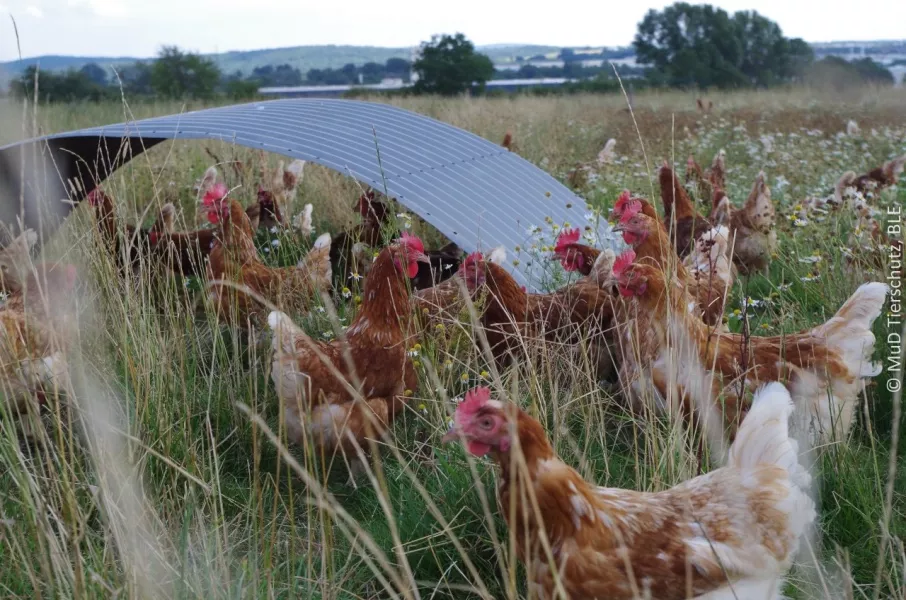Inspirational idea: A national network stimulating knowledge exchange on animal welfare in Germany
Sharing skills and knowledge for animal-welfare oriented, sustainable and environmentally friendly livestock farming.
Netzwerk Fokus Tierwohl is a multi-actor network launched three years ago in Germany to enable and promote the transfer of knowledge focused on animal welfare. Via online tools, events and ‘impulse farms’, the network facilitates the flow of information between farmers, scientists, government and the interested public nationwide. The aim is to ensure that livestock farmers are supported in maintaining productive systems which have animal welfare as a fundamental element.
For almost 50 years, animal welfare has become one of the priorities for EU agriculture. EU animal welfare legislation has evolved to improve the quality of animals' lives. Over the years, this legislation has evolved based on scientific findings, citizens' expectations, and market demands. As a result, many farmers have been involved in projects and initiatives to identify successful solutions. However, in Germany, feedback from many producers on a local level was, that the outcomes of these initiatives were not easy to find. The coordinator of the network, Katja Brase, mentions, “We were missing someone to take the results from all of those initiatives, studies, scientific outcomes and what’s going on farms locally, so we started to collect this knowledge and make it easily accessible to all.”
In response to this, funded by the national ministry for agriculture, all the agricultural facilities of Germany’s 16 states came together to set up a national network. Katja explains, “The information available includes nationwide conformity. Practically speaking, if we have a video about birthing, experts of all states give their green light before we promote it.”
The network has an advisory board with representatives from each state – including the chambers of agriculture and other governmental organisations who enrich the network with experts, but also technical experts, scientists, representatives of German farming organisations and farmers. The advisory board is divided into thematic working groups, which work on the knowledge outcome of the content. There are also ‘animal welfare multipliers’ in each state whose job is to ensure that the content reaches the target groups - farmers, advisors, students, vets, scientists, and other interested members of the public.

The network aims to share knowledge and information on regulation and law as well as on research results and specific technical solutions. Katja explains, “It is important that this information is accessible for all target groups, we work with many different communication tools such as events, farm visits, workshops, fairs, articles, videos or podcasts. Also performing via the Fokus Tierwohl website and social media (Instagram, Twitter, Facebook, Spotify, Youtube…).
The network’s communication team translates information into different formats, from printable guidelines and checklists to podcasts and videos. Katja says: “We use the statistics from our different platforms, counting the clicks etc., to help us know which are the most important or pressing topics for farmers at the moment.”
The network also organises partner events, again in different formats, to pass the animal welfare knowledge to the different target groups. These include online or face-to-face seminars, excursions, workshops etc. Since 2020, 1667 events have been organised across the country, with over 62000 participants in total.
The network facilitates 120 cattle, pig and poultry farms, which they call ‘impulse farms’. These are farms that have applied innovative concepts for animal welfare and transmit knowledge and skills to target groups. The network organises farm visits, demonstrations and workshops.
Fokus Tierwohl has just applied for continuing further three years. Katja explains, “For this next stage of the project, we will integrate a focus on animal welfare linked to climate challenges as it is a very current and important topic which is influencing the sector, especially regarding animal housing and production. We will also include international dissemination as part of our activities.” The network will also increase the number of on-farm activities, as this has been highlighted with particular importance in farmers’ feedback. Katja adds, “The network provides study or trial outcomes and gives animal welfare innovations on farms a platform to transfer the knowledge. Farmers like to learn from farmers, and so practical knowledge is given. An easy access to the knowledge is assured, because it is free to attend or download.”
Contact information
Coordinator Katja Brase: k.brase@vlk-agrar.de
Photo credits: www.fokus-tierwohl.de